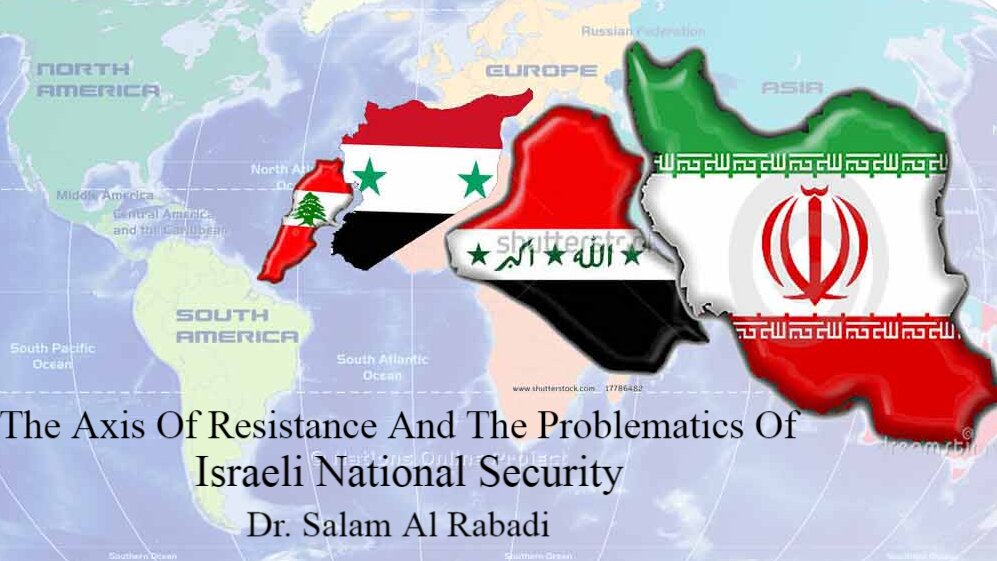The Axis Of Resistance And The Problematics Of Israeli National Security
In
Log in if you are already registered
In principle, wars complement politics, but in Israel wars absolutely remain the norm and politics are the anomalies. The source of the contradictions remains Israel's fundamental and radical alienation from the Arab environment upon which it was imposed. It cannot maintain its security except by accumulating means of force, which deepens its alienation and enhances the impossibility of accepting it. In practice, this reality is unsustainable, neither by trying to increase power nor by further alliances (public and secret), including the signing of futile peace agreements.

The path of Arab-Israeli negotiation and peace process (since the Camp David Agreement in 1978, through the Madrid Peace Conference in 1991, The Oslo Accords 1993, the Wadi Araba Treaty in 1994, and the so-called Abrahamic Accords with some Gulf states in 2020) has proven its failure and its comprehensive inability to deter Israel and change its security behavior.
Where, the policy of accommodation, security alliances, and maximizing economic cooperation did not lead to any significant result in terms of changing Israel’s hostile positions. On the contrary, it has increased its rigidity and obstinacy. The occupying state has been and still is dealing with its security problems through a strategy based on the usual no’s that reflect its security constants, the most important of which are:
1. No to complete withdrawal to the 1967 borders.
2. No to a Palestinian state with full independence.
3. No to stopping settlement operations and dismantling settlements.
4. No to the return of Palestinian refugees.
5. No to any Arab or regional country having a nuclear program.
6. No to any imbalance in the balance of military power.
Accordingly, military superiority remains the main element upon which the occupying state relies in order to maintain its existence. Its uniqueness in this field remains the true pillar of its protection even in the event of peace being achieved. The Israeli national security theory will always remain based on the principle that the occupying entity is based on a geographically limited area.
Therefore, as long as there is vulnerability at the level of strategic depth, it is necessary to rely on a striking deterrent force that preserves Israel’s continuity. However, as a result of the strategic victories of the resistance axis in the July 2006 war, through the Gaza wars (2008-2021) and the global war on Syria (2011-2019), there have become radical changes that entail threats that will have very serious repercussions on the level of the fate and existence of the Israeli occupying state.
In this context, the victories of the Palestinian resistance in Gaza in October 2023 were an extension of this upward trend in terms of restoring the strategic balance between the axis of resistance and the occupying state. Which suffered several severe defeats that brought it to the stage of absolute helplessness. This new reality is inseparable from the process of victories since the July 2006 war and its aftermath, which resulted in many geopolitical developments related to the growing strength of the resistance axis, including:
· Gaining unconventional combat experience: This axis has become capable in the future of fighting multi-level battles that require massive logistical coordination.
· Changing the military concept based on attrition and defense and replacing it with a preventive offensive strategy: based on the principle of penetrating into the occupied territories and launching raids with thousands of missiles at the same moment from several different fronts. Thus radically changing the equation of mutual deterrence with Israel.
This is what was actually experienced in a small way on the ground in the Gaza War in 2021, where the axis of resistance, through the Islamic Jihad movement and the Hamas movement, was able to adopt this strategy, which proved its effectiveness. The Israeli military capabilities were unable to confront and intercept hundreds of rockets that were launched from Gaza at the same time and from different locations. Therefore, these challenges raise real question marks, which revolve around the following question:
Is the Israeli occupation state capable of facing all these challenges in any future war?
It is logical to say that the nature of the challenges facing the occupying state at the level of the structure and concept of its national security has changed in a dramatic and fundamental way, and among those challenges are:
1- The axis of resistance now has huge armed capabilities that can cover the entire territory of the State of Israel.
2- The Syrian army and Hezbollah have offensive military experience as a result of the guerrilla war with terrorist movements supported by the West and Israel.
3- The Axis of Resistance developed its military strategy based on striking Israel’s air and sea superiority.
Here, it must be recognized that the victories of the resistance axis over Israel in the wars in Lebanon, Gaza, and Syria have come to represent a strategic turning point and a real challenge to Israel in terms of its deterrent power and the work of its intelligence services. It is currently suffering from the loss of its most important elements of deterrence. Therefore, any new military confrontation will be complex and will reach every area of Israel's entire area (from the river to the sea).
It seems that the occupying state was never as threatened as it is today, as a result of the development and maturity of the experiences of the resistance axis, which has proven that it now possesses a military and political vision with a logical and rational approach (at the level of thought and practice). We can say that Israel's losing wars and its inability to achieve any of its goals in Syria, Gaza or Lebanon are conclusive evidence of the superiority of the resistance axis at all levels.
In this context, it can be emphasized that the future possibility is inevitably the option of war and comprehensive confrontation. Which will not be (as was previously the case) a conventional war that takes place only on Arab lands and is decided by Israeli military superiority.
On the contrary, this time it will be a war in which the occupying state does not have the initiative. Perhaps the occupying state can start that war, but what is more important is how it manages and ends it. It certainly will not be able to resolve it at all, but more than that, it is likely that this war will inevitably reach every street within Israel itself.
In principle, according to the pattern of development of the strategy of the axis of resistance, it is possible to emphasize the possibility and ability of the axis of resistance to launch a comprehensive attack on Israel (and not just adopt a defensive policy), whether through a barrage of drones and missiles from all fronts (Iran, Iraq, Yemen, Lebanon, Syria, Gaza), which will be accompanied by an attack electronic, such that the “Iron Dome” defense system is unable to fully confront such a large-scale attack capable of striking and disrupting air and naval bases, army centers, and infrastructure throughout Israel.
Not to mention that this coincided with the possibility of launching a large-scale ground attack across all borders within the occupied Palestinian territories. For example, according to reports and studies issued by Israeli research centers and military institutions, Hezbollah in particular has huge military capabilities that enable it to occupy the Galilee region in northern Israel, with dire consequences for the Israeli entity.
Therefore, if the equation that is linked to the resistance’s enormous missile capabilities that were activated in the July 2006 war (Haifa and after Haifa) is approached, and if the equation of drones and naval capabilities (Karish and after Karish) is added, then it is logical that the upcoming future approach will be, at least in accordance with For the equation: Hezbollah’s complete control over the Galilee region and beyond the Galilee within the Israeli entity itself!!




